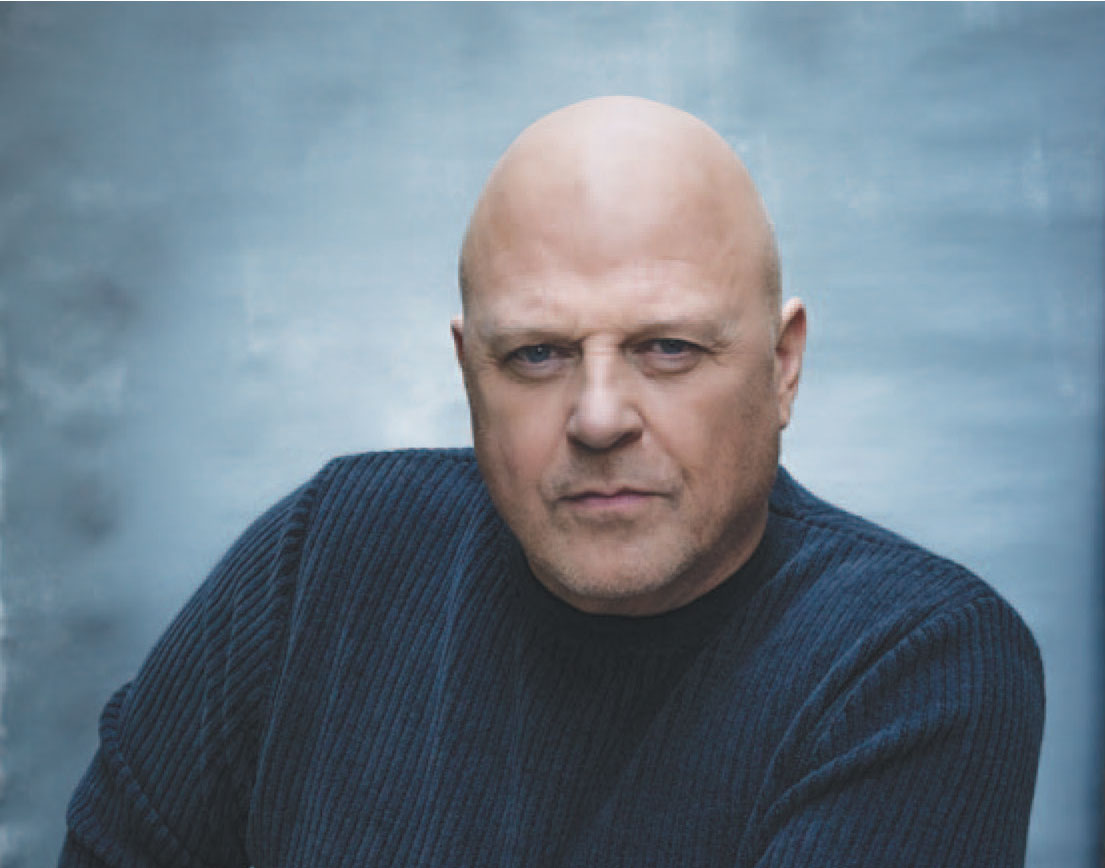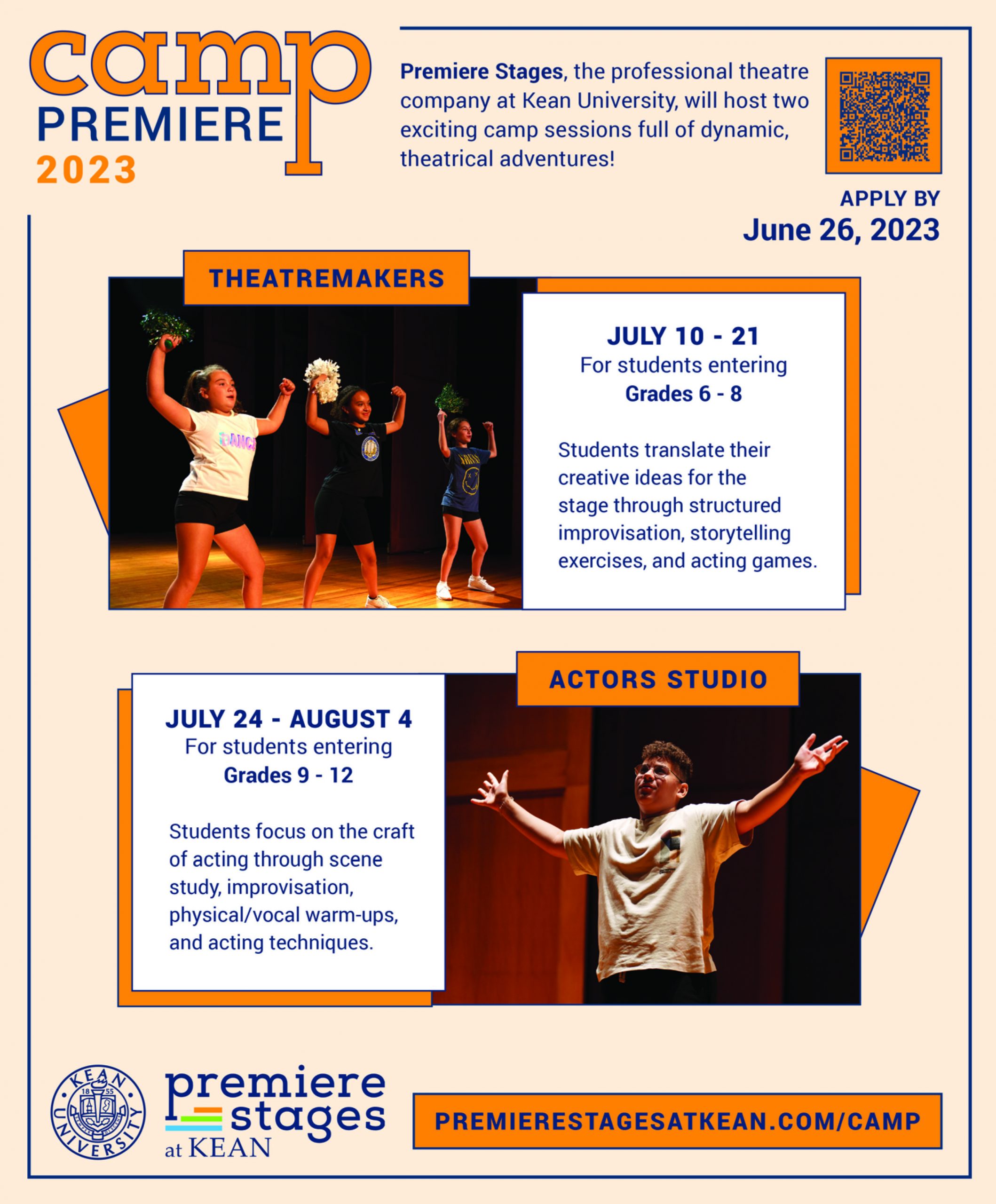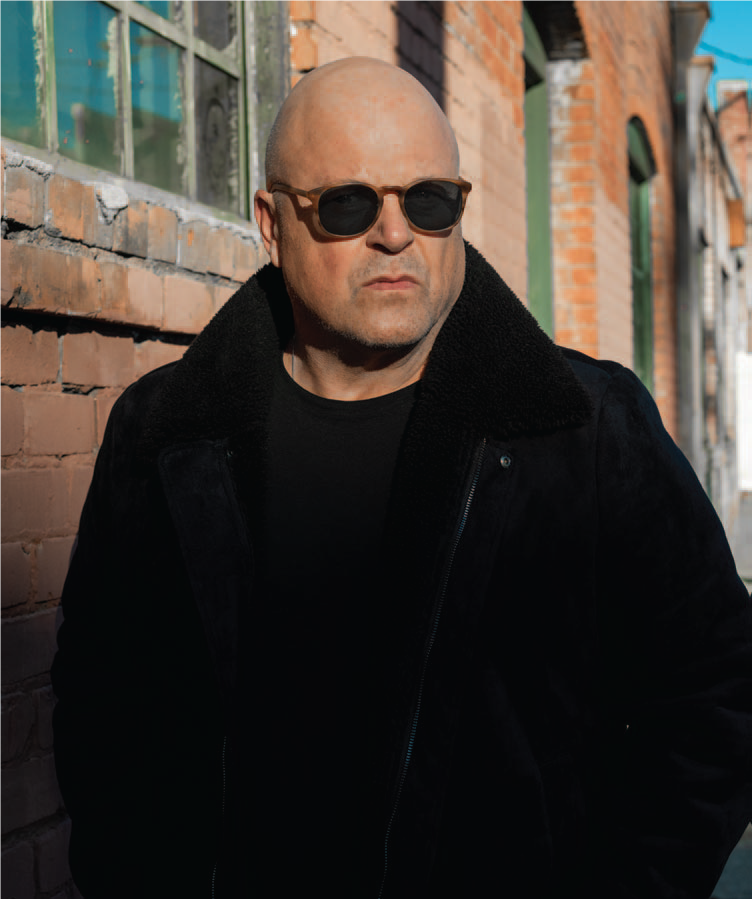
Christian Witkin Inc.
One of the profound challenges for an actor is portraying the humanity of a character in subtle and unexpected ways. Michael Chiklis can do it in his sleep. He made us root for the bad cop on the riveting and often unnerving FX series The Shield and made our hearts ache under fifty pounds of orange rock makeup in Fantastic Four. This year basketball aficionados are loving him as NBA legend Red Auerbach in HBO’s Winning Time and he just finished filming The Senior, the true story of a 50-something college football player. Gerry Strauss wanted to get a feel for how Michael manages to inhabit the myriad characters he has played. Leveraging his own life experience and passion, it turns out, is what makes them leap off the page and onto the screen.
EDGE: What is your process for playing a real person like Red Auerbach?
MC: I basically research them and get a sense of the kind of person that they were from their own words, as well as from others. And then I try to pay deferential homage to them. But I try to keep it real, obviously. To play someone like the late great Red Auerbach is a joy, especially with someone with the pedigree of [executive producer] Adam McKay. My first episode was directed by Jonah Hill and all of my scenes were with John C. Reilly [as Lakers owner Jerry Buss]. We had a great time working together.
EDGE: You grew up a Celtics fan.
MC: Yes, and I wish my dad was still around, because he was such a huge fan and he loved Red Auerbach. I don’t know how a lot of the things that Red did back then would play in today’s world. I mean, can you imagine a guy on the sidelines lighting up a stogie because he feels like the game is over? He was known for his gamesmanship—it wasn’t beneath him to turn the heat up in the guest locker room to 95 degrees and shut the windows. He wasn’t a cheater, but he would definitely push some boundaries, for sure. But I’ll tell you what, when you read books that he’s co-authored or you read books by people like Bill Russell, the way that guys speak about him, his players loved him so much. When you play for someone for years and all you have to say is how much you adore him, there’s something to that, it speaks to a person. Red knew how to manage people. He understood what people needed and treated them with respect. He didn’t just tell them, “I’m the boss, and this is the way it’s going to go.” My understanding of Red is that if you played with him, he loved you and listened to you and collaborated with you. He was very inclusive, progressive and forward-thinking, especially in the city of Boston. That’s why his name is etched in the parquet floor. I’ve had an opportunity to play some really iconic, real-life people through the course of my career, and I approach them all in the same way with tremendous respect— with no ax to grind and no agenda in terms of the way I want to portray them.
MC: I play another real-life guy who was the oldest player in the history of college football. Mike Flynt, at 59 years old, tried out for and made his old college football team. He had been thrown out of school his senior year for fighting with another player and he always regretted it. It’s a redemption tale, an underdog tale, and it’s a really wonderful story and a great script.
EDGE: Your first big role was playing John Belushi in Wired, the film version of Bob Woodward’s book. Not many people outside Hollywood know this story.
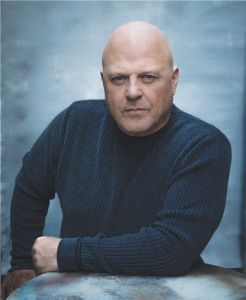
Christian Witkin Inc.
MC: It was heavy, heavy stuff for a 24-year-old. I was a well-trained, raw visceral actor. But this was my first on-camera job. Most people I know in this business, they put their toe in the water, they get their feet wet, they’re an extra on something, they get to see how things work. My very first job was playing an icon in an incredibly controversial mess of a film. I didn’t know what a “mark” was! Someone said, “Hey, Michael, Ed Feldman, an Academy Award-winning producer, and Bob Woodward, the guy who took down Nixon. On the other side of it was Mike Ovitz and Dan Aykroyd and all of the Saturday Night Live folks and the powerhouses of Hollywood. And I had no idea, I was really ignorant. I just thought, Wow, I get to play John Belushi. After Wired, I was being told that I would never work again. snuggle up on your mark.” I’m like, “What’s a mark?” I had no clue, from a technical standpoint, what I was doing. When I played Belushi, people said at the time, “Oh, you were so brave for doing that.” I wasn’t brave. I was ignorant. I didn’t know. And the honest answer is, I don’t know if I would’ve done it if I knew it was going to be so controversial—and especially if I knew that the family was against it. On one side of it was To think that [my career] was over for me before it started—that was a scary time. But I have no regrets. I’m glad that I did it because it started my life in film and television, and I learned a lot. I learned a lot about myself.
EDGE: How did that experience change your perspective?
MC: When you go through adversity of that kind early in your life, it gives you an acute appreciation of simple things—your health, the people around you and, of course, your work, how thrilling and awesome it is. I thought, I have no power, there’s nothing I can do about this. All I can do is do the best work that I can do in whatever situation I can find myself in, and hope that the work speaks, and that I can come up that way. That’s the only thing I knew. I didn’t have any recourse at the time. It certainly wasn’t like now, where the world is so full of grievance. So I just did whatever I could to keep going forward. And I’m still here, and I’m still working and doing really cool projects.
EDGE: When did you first become interested in acting?
MC: My parents tell me that when I was around five, I announced to them that I was going to be an actor and they thought, Next week you’ll be a baseball player, or a fireman, or whatever. But I was an oddly focused young person. I always knew that I was going to do it, and I never changed my mind. I had this sort of myopic view of acting. I knew that’s what I wanted to do, and I don’t know why. As a 58-year-old man, I look at that and I shake my head, and I’m like, How? Some people still struggle with what they’re going to be when they grow up and they’re in their forties. I feel very fortunate that I always had that personal awareness that I wanted to do this for my life.
EDGE: Did you have any early influences?
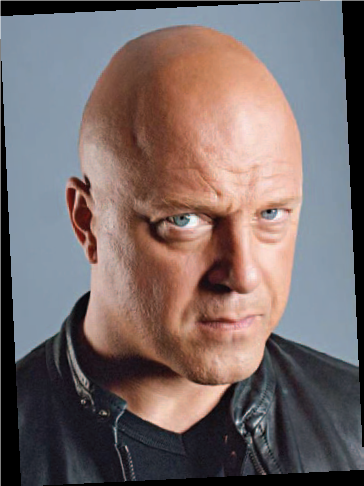
FX Networks
MC: There were a couple of things that flipped switches for me. One was a television show with Frank Gorshin and Rich Little called The Kopykats that was on when I was about five or six years old. I used to do a ton of different voices and I would do them doing other people—like Frank Gorshin doing Rodney Dangerfield. I would stand in front of my big, fat Greek family, and I would go, “Hey, I’ve seen better faces on an iodine bottle.” I’d get a big laugh and that dopamine high from it. So, that was sort of affirming. When I got older I watched movies like On the Waterfront and A Streetcar Named Desire—two films that Marlon Brando starred in. They had a profound effect on me. I remember watching those films in the dark and going, I know this is what I’m going to do. I know I have to do this.
EDGE: Who else moved your career along?
MC: This gentleman named Mark Kaufman became sort of an early theatrical mentor of mine. I had an incredible opportunity to help him open the Merrimack Repertory Theater, a regional theater in Lowell, Massachusetts, the town I was born in. I had sort of a backstage pass to watching that whole process happening, to be there every step of the way. It further affirmed to me, yeah, this is my life, this is what I want to be doing. Also, I was taught very early on that people who have longevity in their career are people who have a root or a foundation in classical training. That’s why I went to Boston University. It offered a classical conservatory setting, and I studied the craft in earnest.
EDGE: How did you envision your acting future as a young man?
MC: I thought my path would be off-Broadway, Broadway, and then to the silver screen from there. That was what I had in my head, but the best laid plans, right? At 21, I moved to Brooklyn after graduation and hit the pavement. I took jobs bartending and waiting tables, and then started doing off-Broadway and off-off-Broadway. Those were fun times, very Dickensian times— the best of times and the worst of times—because it was extremely exciting to be in Manhattan pursuing what I always wanted to pursue. But it could be frustrating and terrifying, fraught with all different kinds of problems and issues. But it was amazing too, it was exciting. I was there for three years when I finally got what I have to consider to be my big break in Wired. I mean, there’s nothing normal about the progression of my life or career as an actor. It’s very, very different.
EDGE: The role with which you’re most frequently associated is Detective Vic Mackey, the lead character on The Shield, which ran for seven seasons. Mackey and Tony Soprano and later Walter White were pioneers of the television antihero in the early 2000s. What went into making The Shield so good?
MC: A couple of things. To me, everything starts on the page. In the case of The Shield, you started with the pertinent thematic question: What are we willing to accept in post-9/11 America from law enforcement to keep us safe? There were other sub-themes, but that was the thematic question posed by the entire series. That’s why it holds up today; it’s an incredibly relevant question to this moment. Having said that, you need very, very thoughtful writers—writers who aren’t heavy-handed and just want to proselytize and beat the audience over the head with something—people who actually want to ask questions from every corner. That’s the basis for a great film or television show. Then you have to cast it correctly. When you think about it, it really is an incredible confluence of things to come together for any film and television show to be good, because it’s such a team sport, right? So many things have to go right. And literally, one thing can go wrong and derail the whole project. We did seven years on a show where I think, as a collective, we all looked at each other and knew that we were doing something special and sort of remarkable, and no one wanted to drop the ball. Everyone wanted to carry their own water, if you will. So, I just think that it’s a miracle of cooperation, it’s a little bit of luck, and it’s a lot of thoughtfulness and restraint.
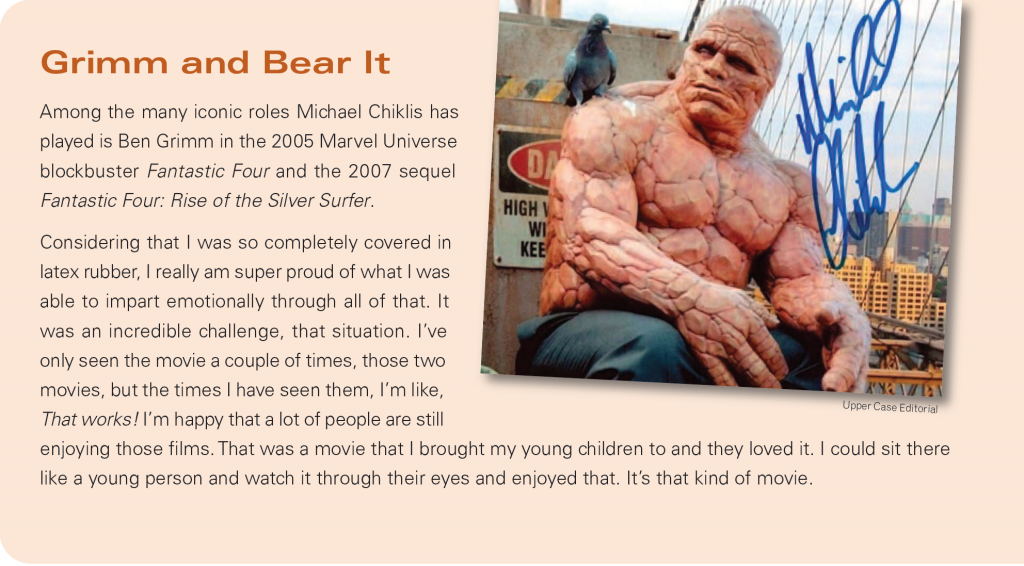 EDGE: How difficult is it to assemble a cast like the one in The Shield?
EDGE: How difficult is it to assemble a cast like the one in The Shield?
MC: Artists notoriously have egos, right? We all have our egos. But I think if your egos are healthy, you keep them in check. You know when it’s time for you to add your pinch of salt, and you know when not to be another cook in the kitchen‚ to let other people do what they do well. If you look at any great series, you’ll hear everyone involved say how collaborative people were, how exciting it was to get up in the morning and go to work every day, how the collaboration was rare and distinct in their career. We’ve all done shows that we wish weren’t on our résumés, and that’s part of it—that’s how you learn what you don’t want to do, how not to collaborate, and how things aren’t supposed to go. I’ve been very fortunate…I’ve been in a number of really, really good collaborations. I noticed that you guys did a cover interview with Jason Alexander, who I recently saw on The Marvelous Mrs. Maisel. That’s an incredible production, incredibly well made, beautifully shot, great cinematography, crisp writing, amazing acting, pacing—that’s a lot of hands, that’s a lot of people. And it’s thrilling when you see something come together that way. It’s thrilling to be a part of something like that.
EDGE: Michael, what keeps you centered at this point in your life and career? I see you’re producing and directing, recording music, getting involved in Alzheimer’s advocacy and even dabbling in martial arts.
MC: All of the above. Peaceful, joyful and centered. Variety is the spice of life, and these things keep me interested and connected to my artistry. I think I’ll never read all the books I want to read; I’m humbled at all that I don’t know—and that I’ll never be able to imbibe. I’m a bit of a seeker in that way. I want to learn as much as I can. The one thing I’m terrified of is complacency. I’ve always felt that, the moment you start to believe in your own hype and think that you’ve got it all figured out, is when the bell has tolled for you. I feel like life is short enough that you can continue learning until your last day. And that’s what I intend to do. I want to try to get better with everything that I do. I’m a drummer, right? When I’m playing drums with friends and singing, it’s pure joy. I don’t go out of my way to promote my music, but I put it out there a little bit so people can find it, but I don’t pursue it in that way. The things that are important to me are very, very simple: my family, my friends, my work, the world, people, I love to travel, I love to read, I love to listen to music of all kinds, every kind. I have the most eclectic music collection of anyone I know. I’ll listen to Rachmaninoff, and then The Tubes, you know what I mean? And everything in between. I guess this is part of my Greekness.
EDGE: How so?
MC: I grew up around a bunch of philosophers. My father is a very philosophical person. And in New England you have the winters and there’s six months at a time where we spent a tremendous amount of time inside talking and arguing and debating and philosophizing. I’m concerned for the world right now because people are increasingly afraid to speak their mind and say what their opinions are, for fear of repercussion. If not for all the debates I had with my friends and my family over the course of years, I wouldn’t have learned so much of what I know. So, I really am a big believer in conversation. I love talking to people, to my children. My oldest daughter is really coming into her own as a writer. She’s a woman of letters, and she’s very bright. My youngest is just going to—I don’t even know—I’m scared of her. She’s so incredible. They’re both incredibly bright. I know I sound like a very, very proud father—which I am—but they merit it, and I’m brutally honest. Fortunately, my oldest lives a mile down the street and my youngest, who recently graduated from college last spring, moved back in, and she’s here temporarily and working hard, and socking money away, trying to set herself up. It’s wonderful that my kids are close. The other thing is, my family loves to cook. The table is a big part of our lives. So we cook together and we sit at the table, and then it gets loud. We’re talking about this thing and that thing, and running things by each other constantly, and it’s impossible to get bored.
EDGE: As you look back at the arc of your career, what thoughts do you feel you can share with actors who are just starting out in the business?
MC: No two people have the same life path, right? So it’s impossible to give someone real advice about how to become a successful actor. There are things I can tell you that I think will help and work for you, and be there for you through the ups and downs. But no two paths are the same. I say this to people all the time that aspire to film and television careers. Actors may have crossover in their careers, but no two actors have the same trajectory. We have crossover in terms of places that we may have worked, or things that we’ve gone through along the way, but I’ve never met two actors with the same trajectory.

